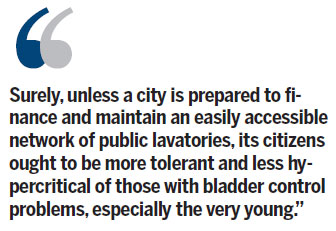The economics of bladder control
Updated: 2014-05-22 05:46
By Tim Collard(HK Edition)
|
|||||||||
Much fuss has been made of a recent incident in which a family visiting Hong Kong from the mainland were harshly criticized for allowing their small child to pass water in the street in a crowded district. This rather trivial incident has generated a considerable swirl of rather ugly sentiments, giving voice to resentments seemingly felt by Hong Kong residents against their mainland neighbors, whom they apparently regard as backward and uncouth. This has cast an unwelcome shadow over Hong Kong's integration into the country.
Lest anyone be tempted to think otherwise, Britons like me have absolutely no wish to see this happen. We no longer seek to exercise any influence over Hong Kong; we wish our former colony well. We are deeply emotionally committed to the seamless and successful integration of Hong Kong in the Chinese polity, while supporting the preservation of those special features which have made Hong Kong so successful. The very last thing we want to see is bad feeling between Hongkongers and their mainland compatriots.
So let me try to put an objective gloss on the urination issue. Having lived on both sides of the Lo Wu crossing, I do not think the roots of this episode are really to be found in cultural conflict. They derive from two undeniable facts. The first is that China, for all her impressive progress over the last 30 years, remains a developing country. The second is that Hong Kong, though an inalienable part of the Chinese entity, is also part of the fully developed world and has adopted a considerable amount of Western culture.
Thus there are fundamental economic factors which underwrite certain cultural tendencies. Children's control of their bodily functions is one of these. In the developed world we don't worry about this too much; we just put the little angels into nappies, or diapers, until they are of an age to manage these matters. We in the West find that the average age at which a child is able to use grown-up facilities is about three, with girls generally getting there a little faster than boys. So we resign ourselves to three years of diapers, knowing this will cost us a small fortune.

People in lower-income countries are forced to think differently. When I lived on the mainland I was mightily impressed by how quickly parents were able to train their children; they seemed to learn the ropes by the age of two or even younger. Of course, the training methods were not always suitable for a royal drawing-room; very tiny children would wear split trousers, so that they could be held over a drain or gutter at a moment's notice, and one had to budget for a considerable number of accidents. But they learnt a good deal quicker than Western children, who lazily relied on their diapers.
My point is that the developing-country model of toilet-training requires quite a long transition period, in which the bladder is not predictable and control is not reliable. During this period, a child's bladder sometimes does not give very much warning. (As a 50-something diabetic, I have a lot of sympathy for this.) And this brings me to another aspect of the economics of the bladder.
The mainland, with its socialist heritage, has always had a widespread and well-signposted provision of public conveniences (it's true that sometimes you don't need signage, you can just follow your nose). Hong Kong, like most market-oriented areas, does not. Yes, I have read a statistic which tells me that there are over 5,000 publicly accessible lavatories in Hong Kong, but they are not always easy to find.
In fact, public toilets are an almost perfect example of a market failure. It is simply impossible to run and maintain a public lavatory at a profit. If you charged anything like an economic fee for usage, maybe 5 percent of people would be desperate enough to pay it, while the other 95 percent would hang on until they got home or would go behind a tree. It can't be done. I wonder what realistic alternatives were open to the parents of the mainland toddler in Mong Kok, and how much time they had to consider and pursue them.
Surely, unless a city is prepared to finance and maintain an easily accessible network of public lavatories, its citizens ought to be more tolerant and less hypercritical of those with bladder control problems, especially the very young. I quite see that the sight of an adult urinating in the street is distasteful, and that it is reasonable to enforce laws against it. But I really don't think that this applies in the case of a small child. And I certainly would not wish to see such a case used to whip up resentments against Chinese citizens visiting a region of China.
The author served 1986-2006 in the British Diplomatic Service, including nine years in Beijing. He is now a freelance writer, journalist and commentator on political, economic and diplomatic affairs, especially China.
(HK Edition 05/22/2014 page9)